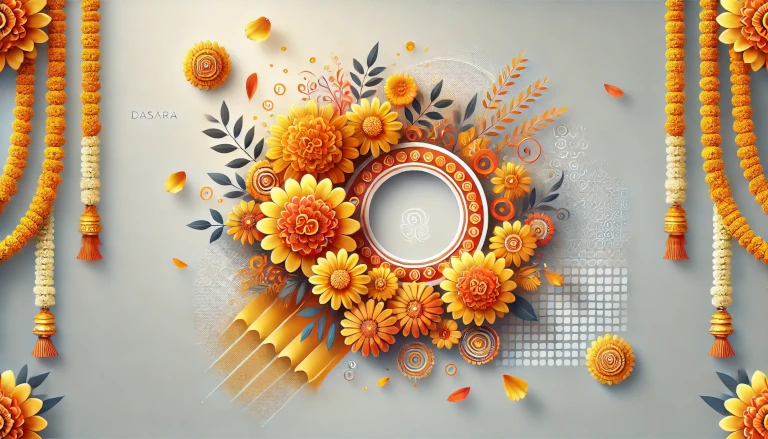Dasara, also known as Dussehra, is one of the most important festivals in India, celebrated with enthusiasm across the country. It marks the victory of good over evil, symbolized by the triumph of Lord Rama over the demon king Ravana. Various customs and rituals are performed during this festival, with Apta leaves and Marigold flowers playing significant roles in the celebrations, especially in Maharashtra and Karnataka.
In this blog post, we’ll explore the importance of Apta leaves and Marigold flowers in Dasara, their symbolic meanings, and how they are used in rituals. Understanding these customs provides insight into the cultural richness of this festival and the values it upholds.
The Cultural Importance of Apta Leaves in Dasara 🌿
The Apta tree, also known as Bauhinia racemosa, is commonly found in India and holds a special place in Dasara celebrations. During Dasara, people exchange Apta leaves, also called Sona Patta or golden leaves, as a symbol of prosperity and goodwill.
Symbolic Significance of Apta Leaves 🌱
- Representation of Wealth and Prosperity 💰:
According to legend, Apta leaves are associated with gold. During the festival, people exchange these leaves as a gesture of good fortune and prosperity. In Maharashtra, they are especially valued as a sign of wealth and abundance. - Reverence for Nature 🌳:
The exchange of Apta leaves signifies respect for nature and gratitude for the blessings it provides. It is a way to honor the natural resources that support human life and agriculture. - Link to the Story of Kautsa and King Raghu 📜:
An ancient legend ties the Apta leaves to King Raghu, who distributed gold leaves to his people on Dasara. Kautsa, a scholar, asked for wealth from King Raghu to pay his Guru. After obtaining gold from Lord Indra, Raghu gifted it to Kautsa, who then distributed it to the public. This story gives Apta leaves their symbolic association with gold and prosperity.
How Apta Leaves are Used in Dasara 🪔
During Dasara, families gather to exchange Apta leaves as a symbolic gesture of sharing good fortune. These leaves are often offered to elders, who bless the younger members of the family. In some places, Apta leaves are placed in the Puja as an offering to deities, reflecting a reverence for nature and its bounties.
The Importance of Marigold Flowers in Dasara 🌼
Marigold flowers are an essential part of many Indian festivals, and Dasara is no exception. Known for their bright and vibrant colors, marigolds are used for decoration and worship during the festivities. They are considered auspicious and are associated with various cultural and spiritual meanings.
Symbolic Significance of Marigold Flowers 🌻
- Symbol of Purity and Positivity 🌞:
Marigold flowers are often used in temple decorations and rituals because they symbolize purity, positivity, and good luck. Their bright orange and yellow colors are thought to represent the energy and power of the sun. - Protection Against Negative Energies 🔮:
In Indian culture, marigolds are believed to ward off negative energies. During Dasara, garlands of marigold flowers are placed at the entrances of homes to protect against evil spirits and bring in positive vibrations. - Connection to the Goddess Durga 🕉️:
Marigold flowers are closely associated with Goddess Durga, who is worshipped during the Navratri festival leading up to Dasara. They are used in offerings to honor the Goddess and seek her blessings for strength and protection.
How Marigold Flowers are Used in Dasara Celebrations 🌺
Marigold flowers are widely used for decorating temples, homes, and Puja altars during Dasara. They are woven into garlands and hung at doorways as Torans, creating a festive and auspicious atmosphere. Marigolds are also used in Puja offerings to deities, especially Goddess Durga, to invoke her blessings for prosperity and well-being.
The Ritual of Exchanging Apta Leaves and Marigold Flowers 🌿🌼
In some regions, exchanging Apta leaves and Marigold flowers has become a symbolic gesture of sharing wealth, prosperity, and positive energy. Families and friends exchange Apta leaves as tokens of gold, while marigold flowers are used to decorate homes and altars. These rituals emphasize the values of generosity, gratitude, and protection, which are central to Dasara celebrations.
Practical Examples of Incorporating Apta Leaves and Marigold Flowers in Modern Celebrations 🪔
- Home Decorations: Use marigold flowers to create beautiful Torans and garlands for your home’s entrance. This not only adds a festive look but also brings positive energy.
- Puja Setup: Include Apta leaves in your Dasara Puja as an offering to the deities. You can also place marigold flowers on the Puja altar to honor Goddess Durga.
- Gift-Giving: Exchange Apta leaves with family and friends as a gesture of good fortune. Accompany the leaves with marigold garlands to enhance the festive spirit.
Embracing the Rich Traditions of Dasara with Apta Leaves and Marigold Flowers 🌿🌼
The use of Apta leaves and Marigold flowers in Dasara celebrations goes beyond mere customs. These elements embody the essence of wealth, prosperity, protection, and gratitude. By embracing these traditions, we honor the ancient cultural values that teach us to appreciate nature, share blessings, and protect our homes and communities.
As we continue to celebrate Dasara, let us remember the deeper meanings behind these customs and use them as a reminder to live with kindness, generosity, and respect for nature.
Discover more from Green Ecosystem - Renewable Energy, Agriculture, and Environmental Sustainability
Subscribe to get the latest posts sent to your email.


